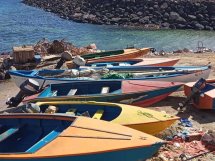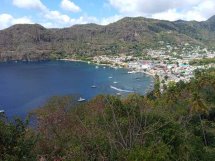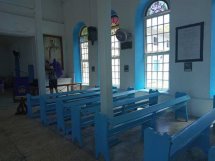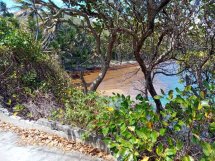Rodney Bay, St Lucia

|
I’m writing
this in Rodney Bay marina 14:00.05N 60:57.00W, at the northern end of St
Lucia. This is our first marina
stop since leaving Grenada, in between times we have either anchored or picked
up moorings overnight. . We arrived in Port Elizabeth on
Bequia on March 20th after a close-hauled sail in 17-20 knots of wind
and picked up a mooring. With
the wind funnelling down the bay, we were happier with a mooring rather than
anchoring. We went ashore in the afternoon,
not expecting to stay out late, but it was just getting dark as we set off back
to the boat -6pm ish – and we had a potentially scary incident: the electric motor on the dinghy refused
to ‘play’ as we let go of the dock (mistake 1 – shouldn’t have let go before we
were certain of the motor) and we started paddling but it was a good half mile
to the boat with lots of other yachts all around and we were not quite sure
which was ours in the dark – and the wind was now taking us seaward. With the engine we could have trolled
around until we found the yacht but with three in the dinghy, we would not be
able to paddle upwind. We had
no torch because we had not intended to stay out late (mistake 2). We had not switched the anchor light on
on the yacht before we left nor set the little strobe light going that we use to
identify our boat (mistake 3). This
was going to get out of hand quickly if we blew past out boat so we paddled to
the nearest yacht and held on to their dinghy – and asked for help. The owner, Swiss French, was a bit wary
of three strangers rocking up in the, by now, complete darkness, but did get out
a powerful lamp for us to scan around to see if we could locate our boat. The Swiss gentleman, to my alarm,
thought it warranted a Mayday call – but fortunately no one responded. His
outboard was also not working so he could not tow us. He did lend us his lamp and we
paddled across the wind a short distance to a catamaran with a dinghy and, it
turned out, Americans on board – an easier language to deal with. The can-do Americans quickly
realized our situation; from their boa t and, with the borrowed torch, we could
see our boat and they towed us out to it. In the morning our engine seemed
fine and we took the torch back and gave the Americans a bottle – they gave us
steaming hot mango-flavoured pancakes – really nice people. Cilla and I had arranged a taxi
tour of the island in the pm and Brian was going on a diving trip – he had spent
time on this island previously.
Our engine failed, again, and Brian rowed to the dive centre and we took
a water taxi ashore. The trip
around the island gave us a flavour of the geography and it is always good to
get away from the waterfront. On
the exposed east coast, the bays were choked with Sargassum weed, a serious and
growing problem. The south coast
had a whaling station which our driver seemed quite unembarrassed about - the
islanders had a licence to take four humpback whales a year – but, fortunately
for whales, averaged only one a year. Apparently each kill is big news and
attracts people from neighbouring island who relish the meat and oil. The whales are hunted from small open
boats about 20 feet long powered by sail and oars – so the whales have to be
close to shore and if whaling has to happen -taking them on from a 20’ foot,
open sailing boat seems to improve the odds for the whale. The following morning, Thursday
23rd, I looked at buying a small, secondhand engine but the only ones
we could locate were too big for our inflatable and the prices were silly. We
filled water from a floating bowser and set off for Young Island, a resort
anchorage on the south of St Vincent.
Ashore we looked at the possibilities of buying another small engine. A
chandler had two new ones but they were very expensive (double the price given
online at another chandlers) and as I thought Rodney Bay may offer more
possibilities we left them. We then visited the capital, Kingstown, by
taxi. Leaving Young Island on Friday
24th, we transited a short way up the coast of St Vincent to Wallilabou Bay
which was the setting for much of the Pirates of the Caribbean films. We
anchored off the coast and a local boatman took a rope ashore to a tree. This was only a short stop a) to reduce
the distance to St Lucia, further north and, b) to clear out of St Vincent –
which all went smoothly. Being calm
and close to the dinghy dock we were able to row ashore to eat in the evening as
the engine was still playing silly Bs. The place was very quiet after the bus
loads of Pirate of the Caribbean fans had returned to their cruise ships in
Kingstown. On Saturday 25th we
left Wallilbou Bay early to be able to make the 40 (ish) mile passage to St
Lucia aiming for Soufriere Bay close by the iconic Piton mountains with time to
find a berth before dark. In
Soufriere we were directed to a mooring close to the fishing village in the
south which turned out to be noisy and the water was dirty. On Sunday morning I dealt with
immigration and then we took a taxi out to see the volcanic sulphur springs
where Brian got muddy and bathed in the foul-looking water with hoards of other
people. Cilla and I went to see the bubbling mud venting from the fumaroles and
met a couple from St Judes in Plymouth.
In the afternoon we moved moorings to a marine reserve in the north of
the bay with the most amazing array of tropical fish life, coral and sea fans in
crystal clear water. This mooring
was in good condition, cost less than the one in Village Bay and we received a
receipt printed up with a list of environmental guidelines. The following morning, Monday 27th, we set off for Rodney Bay with a marina on the north end of St Lucia – our first marina stop since leaving Grenada. We were able to sail a good bit of the way with easterly winds of 14 to 15 knots. Ashore we caught up on a few maintenance jobs and started a hunt for a replacement outboard motor (OBM) without which we would be limited in the places we could visit. That’s where we are now; Cilla is trying to reschedule her flights from Barbados to an Antigua departure. We have shopping to do and a few OBM leads to follow up. When we leave here we are heading for the island of Martinique.
|





